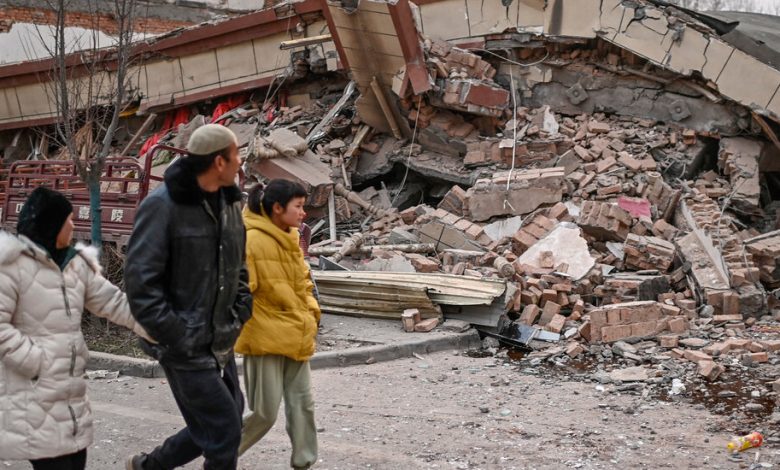Wednesday Briefing: The Aftermath of China’s Quake


A collapsed building in China’s Gansu Province yesterday.Credit…Pedro Pardo/Agence France-Presse — Getty Images
China quake survivors face subzero temperatures
The 5.9-magnitude earthquake that struck northwest China overnight on Monday has killed more than 120 people and injured more than 500 others, officials and state media said yesterday. The quake damaged 15,000 houses and knocked out water, electricity and transportation links in some parts of the region.
Like much of China, the region is enduring sudden cold weather. The temperature during the quake in Jishishan County, the epicenter, was almost -20 degrees Celsius, or about -4 degrees Fahrenheit, according to state media. People who said they were at the quake site reported that they had started bonfires in their yards or set cardboard boxes on fire to stay warm.
Background: Gansu Province was hardest hit, and is one of China’s poorest areas. Parts of the mountainous region fall within a belt prone to earthquakes and many houses may not be built sturdily enough to resist them, a professor at China University of Geosciences said.
What’s next: Hours after the quake, rescuers were still digging out people, according to state media. The government deployed teams to the site to oversee the rescue operation, and China’s top leader, Xi Jinping, ordered workers to repair infrastructure as quickly as possible.
The war in Gaza divides Americans
U.S. voters broadly disapprove of the way President Biden is handling the war in Gaza as the conflict grinds into its third month.
Younger Americans are far more critical than older voters of both Israel’s conduct and of the administration’s response, a New York Times/Siena College poll found. Nearly three quarters of voters between 18 and 29 years old — traditionally a demographic that leans heavily Democratic — disapprove of the Biden administration’s response.
A total of 44 percent of Americans said Israel should stop its military campaign to protect against civilian casualties while 39 percent believe Israel should continue, even if it means that civilian casualties — already totaling nearly 20,000 — continue to rise.
In Israel, polls are less ambivalent: The consensus is that the country needs to take a harder line with the Palestinians. While public opinion of Prime Minister Benjamin Netanyahu is faltering, support for his right-wing government’s policies is growing.
Takeaway: The fractured views on the conflict among younger voters in the U.S. show the difficulty Biden faces ahead of next year’s election. The Times poll found that, for the first time, Donald Trump leads Biden among young voters.
Other developments linked to the Israel-Hamas war:
-
The U.S. announced it was organizing a naval task force to confront the threat from the Houthi militia to global shipping in the Red Sea. Bahrain is the only Middle Eastern country participating.
-
The U.N. Security Council is set to vote on a new resolution for a cease-fire that aims to avert a U.S. veto. The U.S. has blocked two previous attempts.
Iceland eruption was bigger than expected
A volcano in southwestern Iceland, the country’s most populated region, began erupting Monday. In an initial assessment, volcanologists said that the eruption had posed a significant and immediate threat to the Svartsengi Power Plant and the town of Grindavík, which was evacuated last month because of heightened seismic activity.
After experts flew over the site of the eruption, the situation didn’t appear as dire as initially feared. However, the size of the eruption was larger than anticipated, and the direction of the lava’s flow remained unpredictable. Here’s what to know about the volcano eruption.
THE LATEST NEWS
Around the World
-
Myanmar’s ruling military has denied abducting young men to fill its dwindling ranks, but a spate of disappearances is fostering a countrywide climate of fear.
-
Google said it would allow U.S. developers on its Play app store to offer direct payment options to users and would pay $700 million to settle an antitrust suit.
-
Uganda’s harsh Anti-Homosexuality Act, which was passed in May, is hurting businesses that rely on foreign travelers and trade.
-
Using specialized e-commerce sites and secretive shipping workarounds, Russia has obtained the components it needs to keep its economy and war in Ukraine going.
Other Big Stories
-
After two weeks without word from Aleksei Navalny, Russia’s most prominent opposition figure, his lawyers and allies are running a frantic campaign to find him.
-
Five African countries are battling outbreaks of anthrax, but confusion with the test results has raised the possibility that a second disease is circulating.
-
A shortage of key cancer drugs in the U.S. has left many patients without access to chemotherapy.
-
Authorities are worried that Neal the Seal, who has charmed locals in Tasmania, Australia, is spending too much time around humans.
A Morning Read
Every December, Times editors try to capture the best of our photojournalism in one intense presentation: The Year in Pictures. The project is a way to commemorate the big news events: the ones that traumatized us mixed in with some moments of bliss. Take a look.
ARTS AND IDEAS
Your favorite holiday memories
This holiday season, we’re busy preparing a special edition of this newsletter that will soon land in your inbox. And we’d like your help putting it together.
We’re asking you to tell us about your favorite holiday memories — the moments that always make you smile or that hold a special significance. Perhaps your family had a funny tradition when you were growing up, or you experienced some unexpected holiday magic that is now the stuff of family lore. Whatever your favorite memory is, we’d love to hear about it.
If you would like to share your story, you can fill out this form. We may publish your response in an upcoming newsletter. We won’t publish any part of your submission without first reaching out and hearing from you.
RECOMMENDATIONS
Cook: This wine-braised chicken is perfect for a festive dinner.
Read: Three new picture books capture the unique power of light and darkness.
Recover: It looks like a torture device, but this massage tool is a runner’s dream.
Connect: There’s no shame in feeling lonely. Here’s a few ways to reach out.
Play Spelling Bee, the Mini Crossword, Wordle and Sudoku. Find all our games here.
That’s it for today’s briefing. See you tomorrow. — Jonathan
P.S. Oxford’s Word of the Year is “rizz.” Our reporter had to look that one up.
We welcome your feedback. Send us your suggestions at [email protected].





